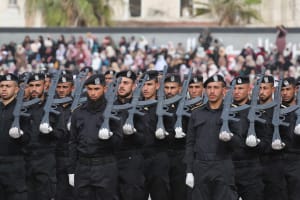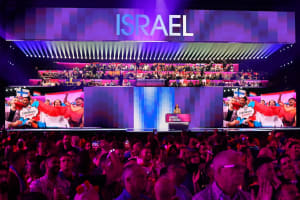World’s largest Evangelical university hosts ambassadors from Israel, UAE, Bahrain to teach students how Abraham Accords are a ‘win-win-win’ deal for Israelis and Arabs
Liberty University deserves great credit for being the first Christian university to hold such an important event – I encourage others to follow

JERUSALEM—I cannot praise the leadership of Liberty University highly enough.
They deserve great credit for making Liberty the first Christian university to begin actively educating their students about the historic importance of the Abraham Accords, why they are a huge answer to prayer, and a fascinating example of “win-win-win” negotiating strategy that can be a model in business and government.
May their tribe increase.
I strongly encourage all Christian universities, seminaries and Bible colleges who believe in Psalm 122:6 – King David’s command for all believers to “pray for the peace of Jerusalem” – to follow Liberty’s example and host an event like Liberty did last week.
On Thursday, the world’s largest Evangelical Christian university – with some 15,000 students on campus in Lynchburg, Virginia, and 100,000 online students worldwide – held a symposium with ambassadors from the three original signatories of the Abraham Accords.
Gilad Erdan, Israel’s ambassador to the United Nations (and ambassador to the U.S. when the Accords were signed), appeared at the on-campus event in person.
Youssef al-Otaiba, the ambassador of the United Arab Emirates to the U.S. and one of the architects of the Accords, appeared via satellite from Morocco where he is visiting on diplomatic business.
Shaikh Abdullah bin Rashid Al Khalifa, the Bahraini ambassador to the U.S., also appeared via satellite.
The event was moderated by Robert Greenway, who served as the director of Near East affairs on the National Security Council during the Trump administration, played a key role in helping broker the Accords, and now serves as executive director of the Abraham Accords Peace Institute.
Here are a few highlights.
ISRAELI AMBASSADOR: THERE IS A BIBLICAL SIGNIFICANCE OF THE NAME “ABRAHAM ACCORDS”
“I grew up in a religious home in Israel,” Ambassador Erdan told the students. “So, I studied the Bible since I was very young. And it's important to pay attention to the name that was picked, the ‘Abraham Accords.’ Why? Because, as we all know, Abraham was the father of monotheism. He was the one who revealed the belief in one God. One of his main characteristics was his tolerance and the fact that his house, his tent, was open for everyone, regardless of who he was….And that is why it was so important to pick this specific name, the Abraham Accords, to show everyone what are the values that we want to see around us in the in the Middle East.”
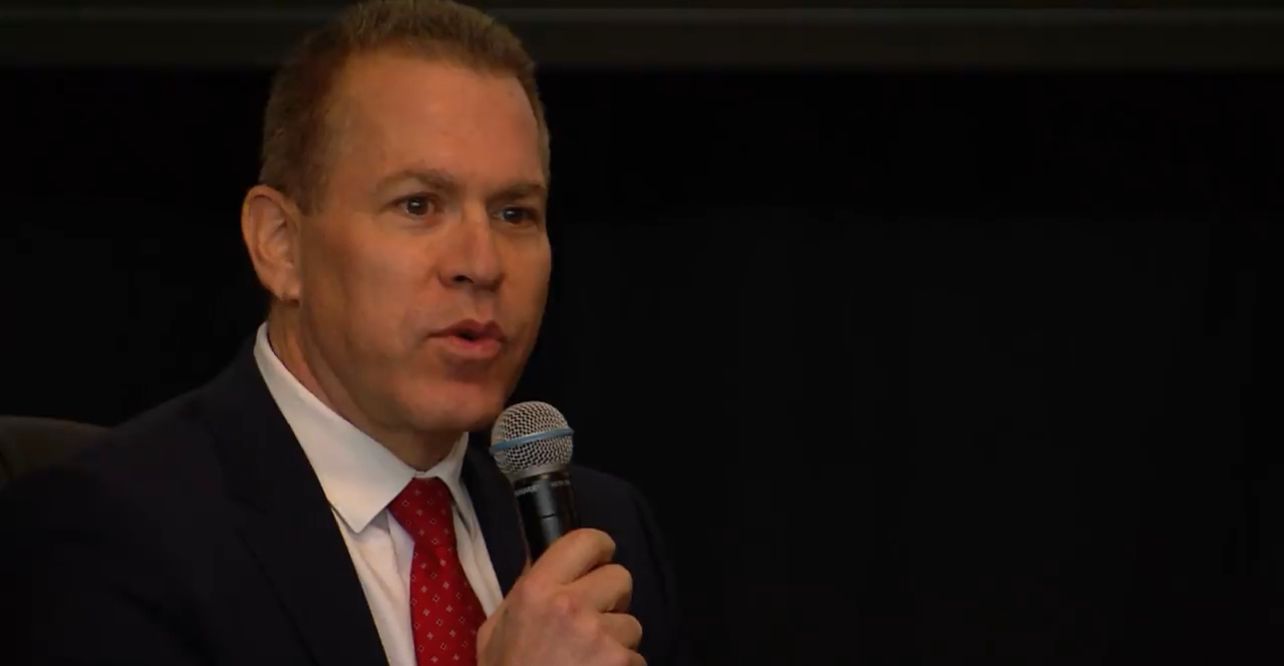
Erdan praised President Donald Trump and his advisors who, he said, “conveyed the message that the road to Washington passes through Jerusalem.”
Trump and his team, he added, “were willing to incentivize all of us to come closer together.”
Erdan also noted that Israel and her Arab neighbors “realized that we have some mutual national interests that are quite similar, like we have to provide food security to our people in an arid climate, we have to solve the problem of water scarcity, [and] producing renewable energy.”
“We also…have to thank Iran for bringing us closer together, and for the speed that these agreements are being implemented,” Erdan noted, “because we all understood that we share also the same security threats” from the Iranian regime which is pursing terrorism and nuclear weapons.
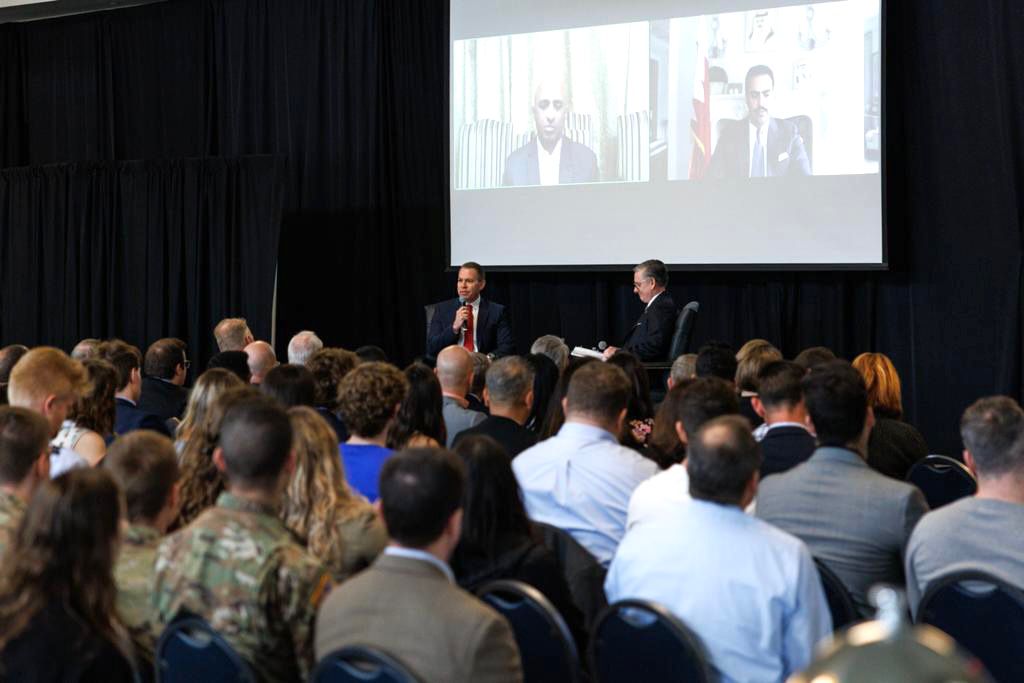
BAHRAINI AMBASSADOR: SO MUCH PROGRESS HAS BEEN MADE IN 19 MONTHS
Bahraini Ambassador Al Khalifa noted that there was a great deal of skepticism when the Accords were first signed in September 2020 that any real, tangible progress would made, but stressed that the three original signatories have defied the skeptics.
“Nineteen months later, we see a lot of government-to-government work that's been done – 37 MOUs [Memorandums of Understanding] have been signed so far, and in so many different sectors. We have direct flights [between Bahrain and Israel]. We have ambassadors and embassies that have been opened.”
“What we're trying to do right here is to instill hope in the region through progress,” he said, adding that the credit belongs to Bahrain’s King Hamad for having the courage and the foresight to forge peace with Israel and calling the Accords “a once in a lifetime chance that we have” to change the entire future of the region.
Bahrain, he said, is pursuing a long-term “warm peace strategy.”
“His Majesty, the King, has taught us that without peace, communities are very limited in terms of how much they can grow and prosper.”
Though Al Khalifa did not mention the Iranian regime by name, he did warn the students and faculty that for all the progress that has been made thus far “the only challenge that we will face is by state and non-state actors that will try to hinder any progress that we're trying to achieve.”
UAE AMBASSADOR: THE ABRAHAM ACCORDS ARE A “WIN-WIN-WIN” FOR ISRAEL AND THE ARABS
Ambassador Otaiba discussed why the UAE was the first Arab country in a generation to make peace with Israel, and why its leader – Crown Prince Mohamed bin Zayed al Nahyan (MBZ) – believed 2020 was the right time to make the deal.
“The one thing I am the most proud of – of the way the Abraham Accords were concluded – was that for three key countries in the region, like UAE, the US, and Israel, no lost,” Otaiba told the students. “No one suffered. No one had to concede anything. Everyone came out better off post-Abraham Accords than they did pre-Abraham Accords. No one had to give up something like land or territory or something strategic. So I think it was a win-win-win for everyone involved.”
He also believes that the deal preserves a two-state solution for the Palestinians and Israelis.
Otaiba also praised the tremendous progress that has been made since the Accords were signed.
“If you and I were having this conversation just two and a half years ago, a year before Abraham Accords, and we said, ‘Can you imagine 300,000 Israeli tourists visiting the UAE in the middle of a pandemic? Can you imagine 2 million visitors to the Israeli Pavilion at the World Expo [in Dubai] in the middle of a pandemic? Can you imagine, Israeli President Herzog and Prime Minister Bennett [visiting the UAE during a pandemic], or the recent meeting in Sharm el-Sheikh between Crown Prince Mohamed bin Zayed, President Sisi, and Prime Minister Bennett?’ If I asked you, ‘Would you imagine or picture any of this happening two and one half years ago?’ You would have called me crazy and you would have been totally right to think that I was crazy.
“But here we are. They're happening. And they're happening, you know, quite normally without a backlash, without any drama.”
And yet, he said, “I think we are still just skimming the surface of the potential of the Abraham Accords.”
“What's really happening is that we're getting to know each other. What's really happening is we're starting to understand each other.”
“Working for peace is hard,” Otaiba told the students. “It's not easy. Look, President Sadat is a personal hero of mine. He took the first and arguably the most courageous step any Arab leader has taken, and he paid for it with his life.”
“Thank you, Ambassador – well said,” commented Rob Greenway. “I can't and won't speak for Liberty, but I think the Schools of Business and Government would probably welcome you back to talk about the formulation of a win-win-win negotiation…and I think there's also an opportunity for papers to be written on the subject.”

JOHNNIE MOORE: LIBERTY ALLOWED STUDENTS TO HEAR DIRECTLY FROM THE ARCHITECTS OF HISTORY
Rev. Johnnie Moore, former vice president of Liberty University and a member of the ALL ARAB NEWS Advisory Board, also participated in the event, which was attended by hundreds of Liberty students, faculty, staff, and local business leaders.
“Almost nothing in a divided America brings together Americans like the Abraham Accords,” Moore told me after the event, praising the bipartisan nature of the Accords. “In many ways, one of the benefits of peace between Israel and her Arab neighbors is that it makes a place for political peace, even in the U.S. and in every corner of this country, whatever the religious or political lines that divide us.”
“I left this event at Liberty unbelievably excited about the future,” Moore said. “I’m excited about the future of peace in the Middle East, and excited about future generations who are learning what is possible because of the leadership of these once-in-a-generation figures in Israel and the Arab world who decided to not live in the past, but to hand a better future to future generations.”
He was especially encouraged to see Liberty take the lead in holding such an event, saying this exactly how a Christian university should train future leaders.
These young students, he noted, weren’t learning about history simply from a textbook.
“They heard first-hand from the architects of the Abraham Accords what's possible in our world” when Arab and Israeli officials at the highest levels choose to become the very peacemakers praised in the Bible.
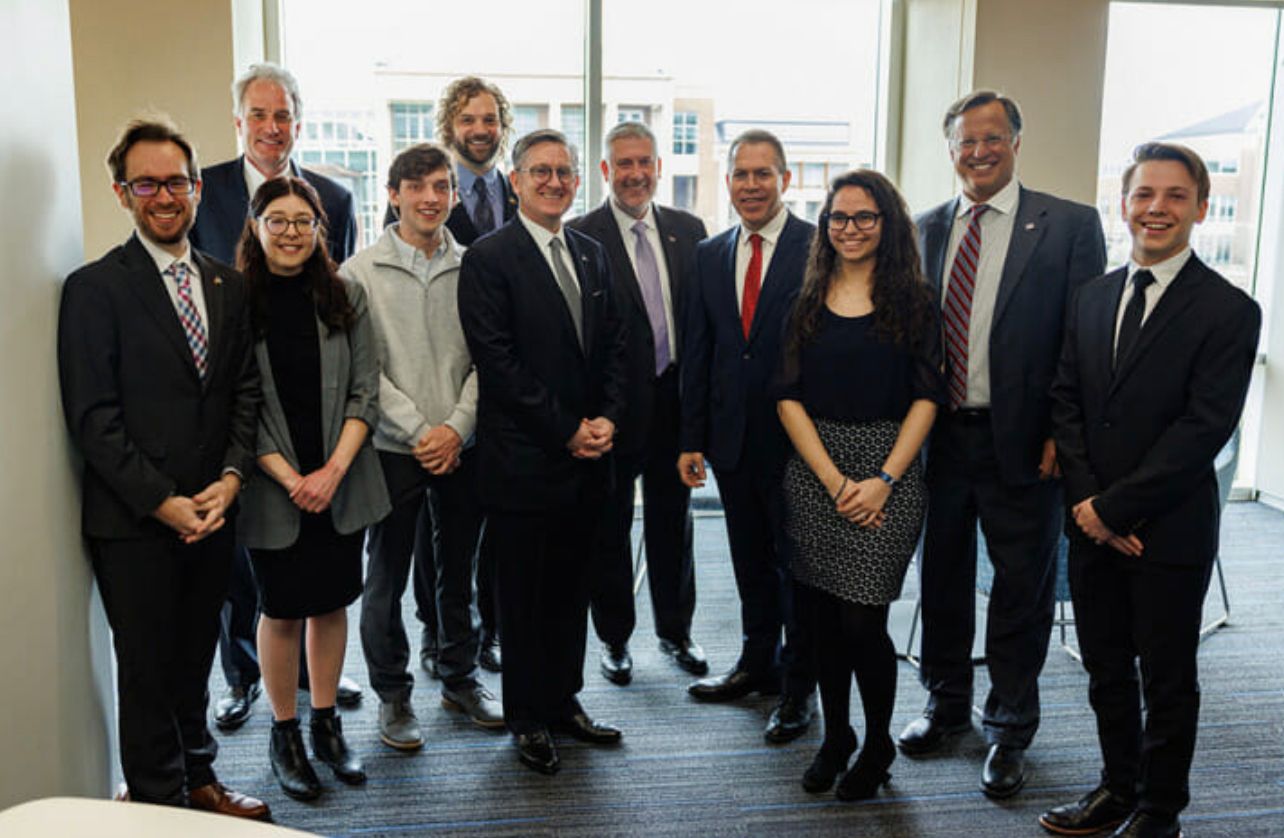
LIBERTY PROVOST: FEW KNOW THE ROLE LIBERTY’S FOUNDER PLAYED IN FORGING PEACE BETWEEN ISRAEL AND EGYPT
“Liberty was founded in a Judeo-Christian heritage, a heritage that made American higher education the envy of the world,” said Scott Hicks, Liberty’s Provost. “Many things have happened in our 50-year history. But one of the least appreciated brings us to today's important event. It was the visionary role that our founder [Dr. Jerry Falwell] took to solidify the relationship between Israel and the global Evangelical community. But also his role in subsequently forging an elusive peace between Arabs and Israelis in the Middle East over a generation ago.”
“Theodore Herzl, Israel's founding father, may have first coined the term ‘Christian Zionist,’” noted Hicks. “But still, it was our late founder, Dr. Jerry Falwell, Sr., a century later, who popularized Christian Zionism, inspiring millions upon millions of Evangelicals to become the best friends of Israel and the entire world. The friendship lives on today. There is no university in America that is more friendly to Israel than Liberty University. And that is something that we should not be taking lightly or for granted in this time of rising anti-Semitism.”
“But there's another part of our founder’s friendship with Israel that's often untold. That is the role he played in forging peace between the State of Israel and the Arab Republic of Egypt,” Hicks added. “It is possible that there never would have been a peace between Israel and Egypt if it were not for his deep friendship with Israeli Prime Minister [Menachem] Begin, a proud Jew, and the Egyptian President [Anwar] Sadat, a proud Muslim. Since then, Evangelicals have often been helpful intermediaries between the Arabs and Israelis at critical moments in the Middle East. It all happened again a generation later, as influential evangelical advisers to the Trump administration had a front row seat to a historic peace between Israel and her neighbors, including the UAE, Bahrain, Morocco and Sudan – including our own distinguished Liberty graduate, former vice president, and former campus pastor, Johnnie Moore.”

Joel C. Rosenberg is the editor-in-chief of ALL ISRAEL NEWS and ALL ARAB NEWS and the President and CEO of Near East Media. A New York Times best-selling author, Middle East analyst, and Evangelical leader, he lives in Jerusalem with his wife and sons.







